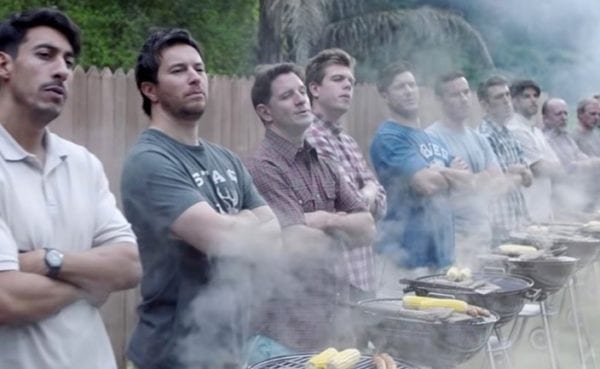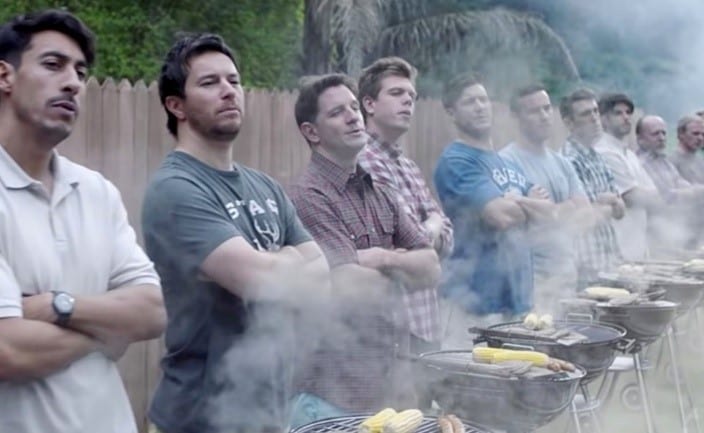

Gillette took to social media to air their new “We Believe” advertisement in early January of 2019. The ad depicts what some would consider the issues related to the common “boys will be boys” mind set and the issues related to current social movements. The ad depicts men of all ages partaking in behavior that many found very controversial to begin with. The ad begins with audio from various newscasts that reported on several controversial topics such as the spread of the #MeToo movement and other ways in which men were involved in cultural movements from the past couple of years. The ad continues to show how these ideas are spread by depicting a scene where fathers are standing around a barbeque laughing and as making excuses as their young sons fight. Another scene depicts a very young boy crying to his mother after his peers had sent him text messages calling him derogatorily terms and questioning his masculinity. Bullying, toxic masculinity, and sexual harassment are all addressed within the short ad campaign. While some believe this ad is challenging men to hold themselves to a higher standard, others disagree and feel that this ad is shaming them based on their gender. The commercial begins by showing men partaking in controversial behavior such as cyber bullying, cat calling, and fighting. The ad then challenges these men to step above these actions by depicting ways men can avoid partaking in and teaching such things to younger generations.
Scott Galloway, founder of the business research firm Gartner L2 and a professor of marketing at New York University, argues “The ‘woke’ business strategy will be a big theme in 2019 as that’s where the money is.” People who seem to agree with Proctor and Gamble’s stance on the issues in “We Believe” applaud the commercials portrayal of real world issues such as bullying and the #MeToo movement. These pro “We Believe” Twitter uses have defended the ad stating “This commercial isn’t anti-male, it’s pro humanity” (Evans 2019). Other viewers have taken to social media and other platforms to discuss their dissatisfaction with Gillette’s message. These viewers seem to feel that this ad blames certain social issues of today on all males regardless of true character. Political commentator, Ben Shapiro remarked on the issues he saw in the Gillette campaign: “This ad is all about how men have created a crisis of masculinity in America. How men have trained their boys to be bad. How men are solely responsible for all of the ills in American society. An ad created by a company who makes their money off of men shaving” (Shapiro 2019). Along with Shapiro, the hash-tag #BoycottGillette has rapidly gained recognition after the company released this ad. Twitter users in support of this boycott find that “a company who has asked us to celebrate masculinity for 30 years suddenly wants us to feel ashamed of it.” (Grant, 2019). Others agreed with Gillette’s message about harmful gendered stereotypes but remained skeptical about companies like Gillette and Nike using social justice imagery and messages in a calculated attempt to sell products and brand.
Time will tell if such advertising campaigns help or hurt companies’ bottom lines. But the question stands: Is Gillette’s “We Believe” advertisement a smooth use of important social topics or simply another way to gain a positive image among consumers?
Discussion Questions:
- Was it smart for a company like Gillette to air a commercial like this or do you feel it will inevitably hurt them as a brand? Why do you think this?
- Will this affect the future of advertising and the way companies leverage social issues in campaigns?
- Do you think Gillette could’ve accomplished their message without sparking an enormous controversy?
- Do you agree that it was hypocritical of Gillette to air this commercial or do you think they’re trying to right past wrongs?
- Which brands and in which ways could you see classic male brands aligning or disagreeing with Gillette for Men?
Further Information:
Evans, Erica. “Gillette Is Being Praised and Condemned for an Ad about ‘Toxic Masculinity.’ Here’s What People Are Saying.” DeseretNews.com, Deseret News, 15 Jan. 2019, Available at: www.deseretnews.com/article/900050816/gillette-is-being-praised-and-condemned-for-an-ad-about-toxic-masculinity-heres-what-people-are-saying.html
Gant, Michelle. “Gillette Addresses ‘Toxic Masculinity’ in New Ad Campaign.” Fox News, Available at: www.foxnews.com/lifestyle/gillette-addresses-toxic-masculinity-in-new-ad-campaign
McCluskey, Megan. “Gillette Makes Waves With Controversial New Commercial.” Time, 15 Jan. 2019, Available at: www.time.com/5503156/gillette-razors-toxic-masculinity/
Meyersohn, Nathaniel. “Gillette Says It’s Satisfied with Sales after Controversial Ad.” CNN, 23 Jan. 2019, Available at: www.cnn.com/2019/01/23/business/gillette-ad-procter-and-gamble-stock/index.html
Authors:
Grace Holland & Scott R. Stroud, Ph.D.
Media Ethics Initiative
Center for Media Engagement
University of Texas at Austin
February 26, 2019
This case study can be used in unmodified PDF form for classroom or educational settings. For use in publications such as textbooks, readers, and other works, please contact the Center for Media Engagement.
Ethics Case Study © 2019 by Center for Media Engagement is licensed under CC BY-NC-SA 4.0



